The need to raise awareness of screen use
In an increasingly digital world, the use of screens has become ubiquitous, especially among children. This reality raises major concerns about the effects on the health and well-being of younger generations. That’s why our awareness-raising workshop aims to help elementary school and teachers tackle this crucial issue. In this article, we introduce you to this workshop and explain how you can gain free access to all the resources you need to organize it successfully.
Workshop presentation
Workshop objectives
The main aim of our workshop is to raise awareness among pupils and teachers of the issues surrounding excessive use of screens. We aim to :
- Promote responsible use of screens.
- Encourage a healthy balance between screen time and physical activity.
- Provide participants with tools to understand and manage their screen time in an informed way.
Target audience
This workshop is specifically aimed at pupils from K12 and elementary school teachers. It is designed to be interactive and adapted to each age group, guaranteeing an enriching experience for all participants.
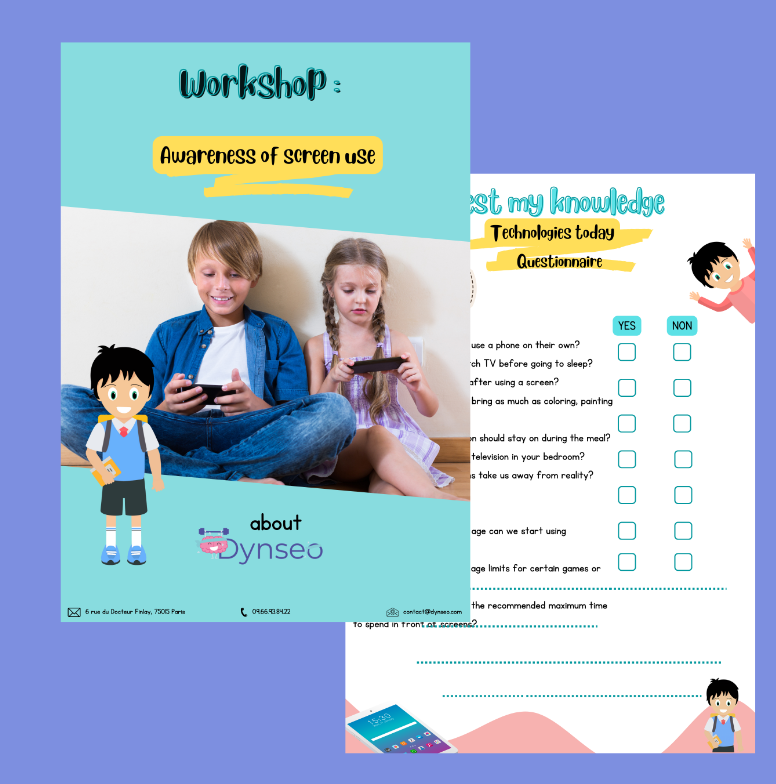
Workshop content
The workshop includes a variety of interactive activities, discussions and exercises designed to engage children in a positive way. Topics include:
- The advantages and disadvantages of using screens.
- The consequences of overexposure to screens on health and well-being.
- Strategies for balancing screen time and outdoor activities.
- Tips for responsible use of digital media.
Free Workshop Resources
Course of the Workshop
The workshop is carefully structured to maximize its educational impact. It includes an introduction, interactive activities, group discussions and a reflection session. This structure enables participants to follow a complete educational path.
Knowledge Questionnaires
A key aspect of our screen-awareness workshop is to encourage children to think critically about their relationship with screens and digital media. For this purpose, we developed a knowledge questionnaire specially designed for the children taking part in the workshop. There will be a knowledge questionnaire at the start of the workshop, and another at the end, to measure changes in understanding and attitudes after the workshop.
Here are a few questions from the Knowledge Start questionnaire, with open-ended questions that allow children to express themselves freely and share their thoughts.
- Do you think kids can use a phone on their own?
This question aims to understand children’s perception of their own ability to use electronic devices. - Is it a good idea to watch TV before going to bed?
This question explores the idea of the impact of pre-bedtime screen time on sleep quality. - Can you get overexcited after using a screen?
By asking this question, we invite children to think about the emotions that can arise after prolonged exposure to screens. - Is playing the console as rewarding as coloring, painting and decoupage?
This question encourages comparisons between digital and traditional creative activities. - Do you think the TV should be left on during meals?
This question addresses the notion of social interaction during meals.
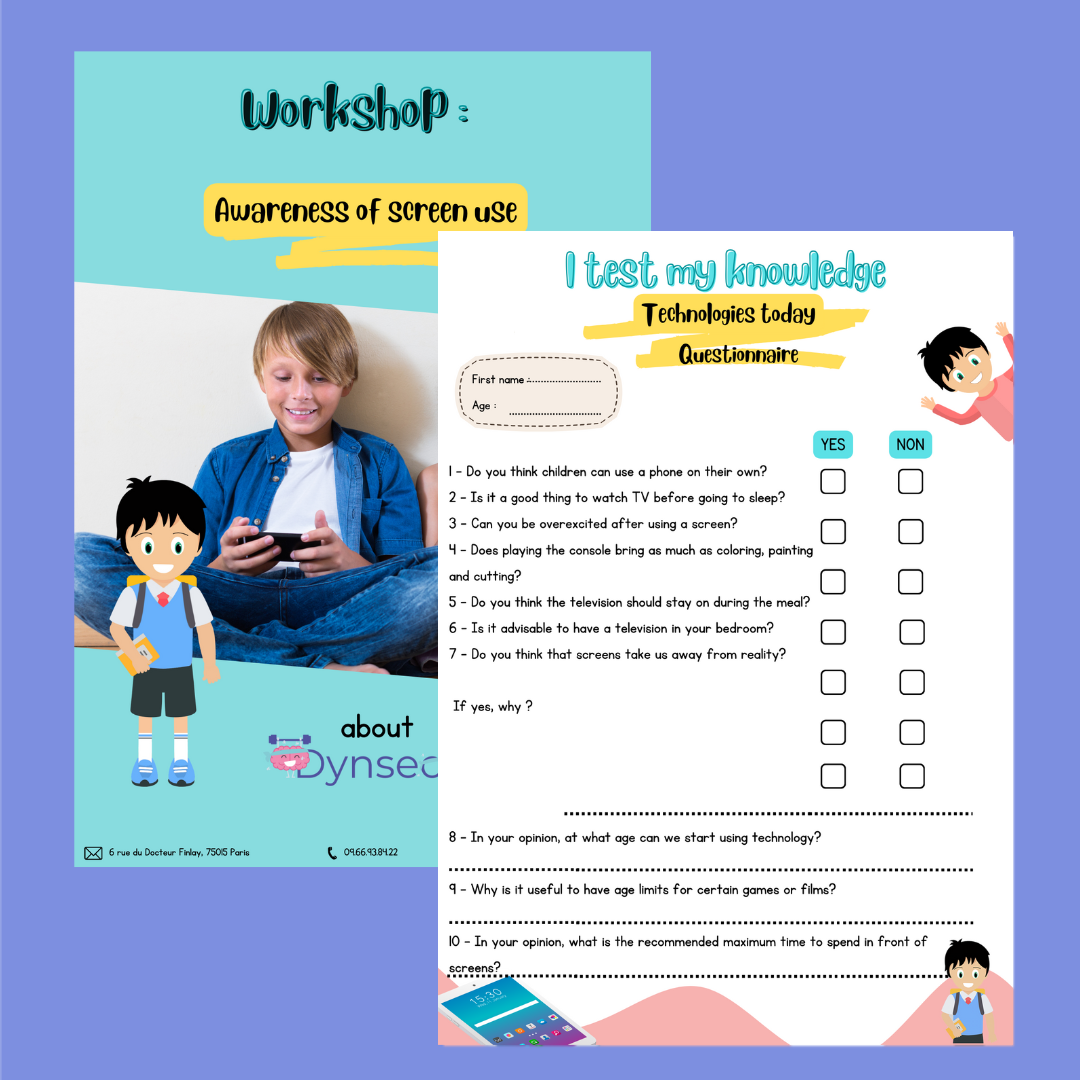
6. Is it advisable to have a television in the bedroom?
This question explores the idea of having a screen in the bedroom and its implications.
7. Do you think screens take us away from reality? If so, why?
Children are encouraged to think about the impact of screens on their perception of reality.
8. What age do you think is the right time to start using technology?
This question encourages children to think about the right age to start using digital devices.
9. Why is it useful to have age limits for certain games or films?
Children are invited to think about why it might be important to have age restrictions for certain content.
10. What do you think is the maximum recommended screen time?
This question prompts children to think about the appropriate length of time to use screens during the day.
The use of open-ended questions in this questionnaire allows children to express themselves freely and share their opinions. In addition, we encourage participants to keep their answer sheets and discuss them with their parents at home. This approach encourages family dialogue on the responsible use of screens, which is essential for effective awareness-raising.
By asking these questions, we aim to encourage children to think critically and help them develop a deeper understanding of the impact of screens on their daily lives.
Explanations for the host
We provide the facilitators with all the information and instructions they need to run the workshop. This ensures that the workshop runs smoothly and efficiently.
Workshop presentation
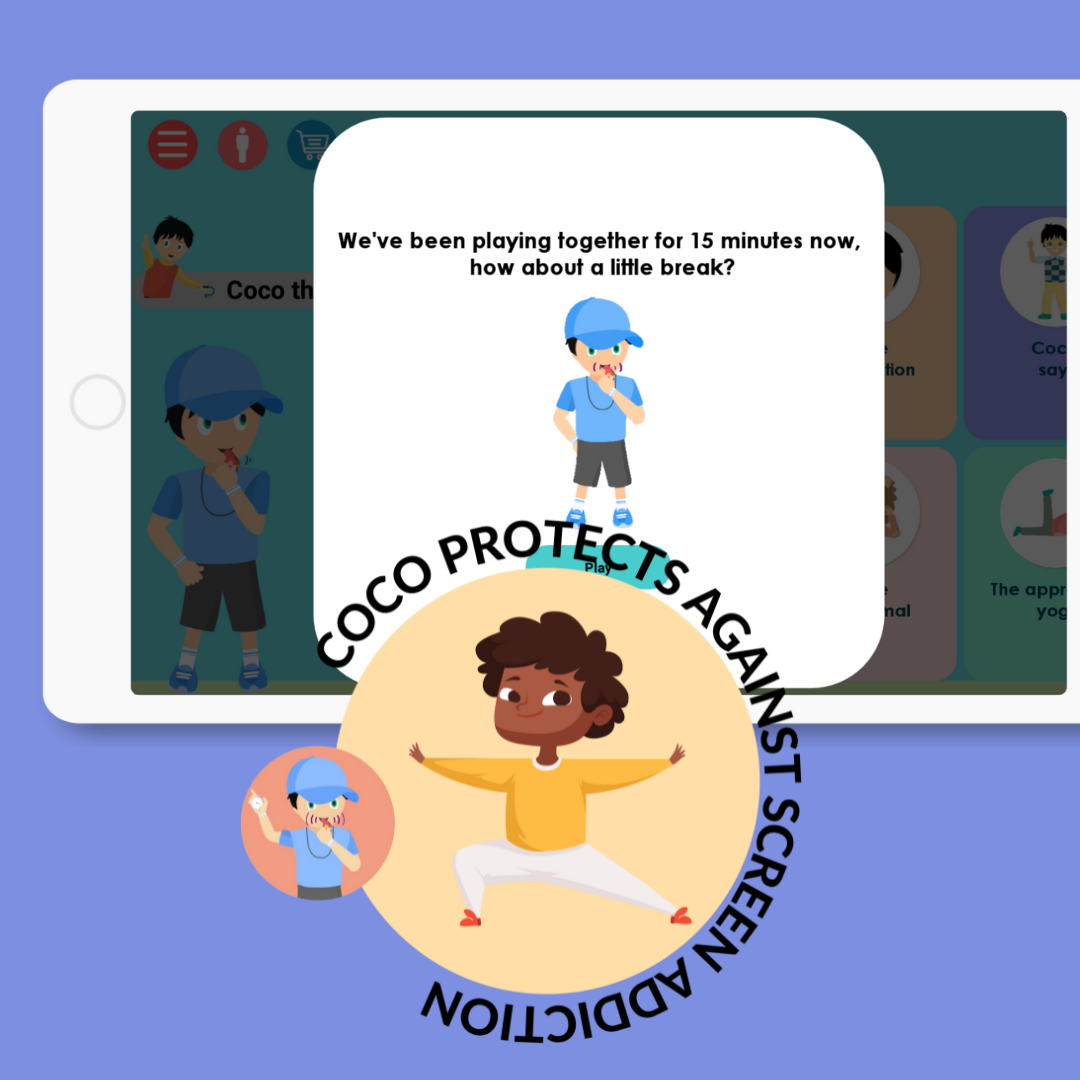
Our aim is to instill in children a healthy habit that can accompany them throughout their lives: taking regular breaks to move, stretch and stay active, even when using screens. By integrating this practice into their daily use of screens and consoles, we help them create a healthy balance between the digital and real worlds.
End of Workshop Questionnaire: reflecting on the impact of the sports break
At the end of our screen-awareness workshop, we invite children to take part in an end-of-workshop questionnaire. This questionnaire not only measures knowledge acquired, but also plays a crucial role in encouraging children to reflect on their experience.
An important part of this questionnaire is dedicated to the “Sports Break.” We ask specific questions to help children realize the positive impact this practice has had during the workshop. For example, we ask them if they have felt an improvement in their concentration, energy or well-being after incorporating active breaks.
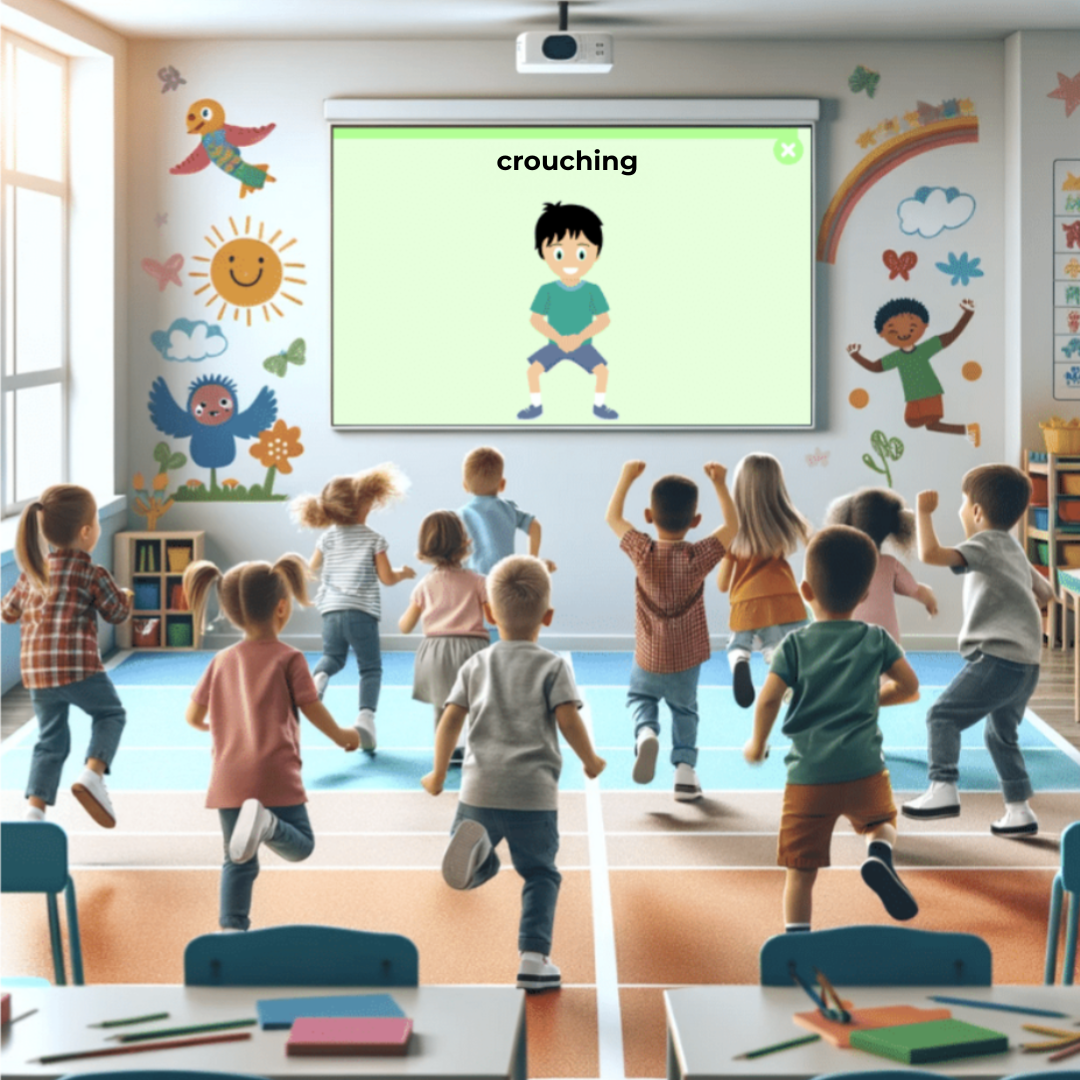
This encourages children to reflect on their own sensations and experiences, reinforcing their understanding of the benefits of balanced screen use and integrating physical activity into their routines. What’s more, these reflections can serve as a starting point for family discussions at home, where children can share their discoveries with their parents.
The end-of-workshop questionnaire is therefore a powerful tool to help children become aware of the benefits of responsible screen use, including the integration of the “Sport Break”, and encourages their commitment to maintaining this balance.
Diploma for Children
At the end of the workshop, each child will receive a diploma in recognition of their participation and commitment to raising awareness of responsible screen use.
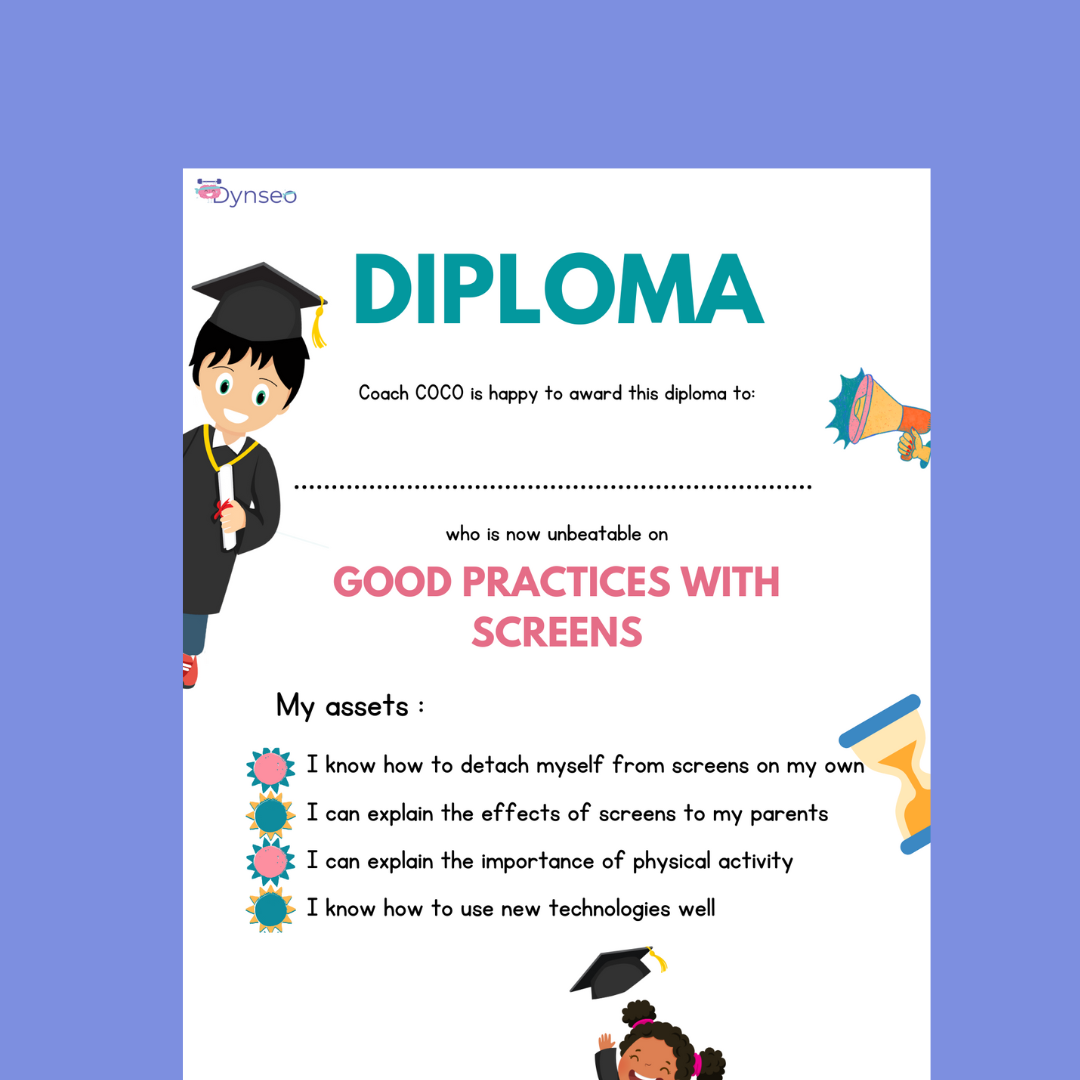
Tips for Families: Balancing the Real and the Screen
Our screen-awareness workshop is accompanied by a practical booklet for families, designed to help parents guide their children towards responsible screen use. Here are some key points from the booklet:
Recommended screen time
For each age group, we recommend limiting daily screen time. For example, for children aged 3 to 6, one hour a day is a recommended limit. This helps maintain a balance between the digital and real worlds.
Use in Free Moments
Encourage your children to use screens during quiet, free moments of the day, such as after school or before dinner. Screens can be used as a means of rest, but it’s important to set limits.
Avoiding Screens Before Sleeping
The blue light emitted by screens can disrupt sleep. We recommend avoiding the use of screens for at least an hour before going to bed, for better quality sleep.
Attention to Visual and Cognitive Fatigue
Screens can cause visual fatigue and drain children’s attention. Prolonged use can have negative effects, so it’s essential to monitor screen time.
Setting Limits and Providing Benchmarks
Establish clear rules for screen use, including how much time is allowed and when. Limits allow children to better manage their screen time.
Explain the Risks
Talk to your children about potential online dangers, such as not talking to strangers or making unauthorized online purchases. Also explain the negative effects of screens.
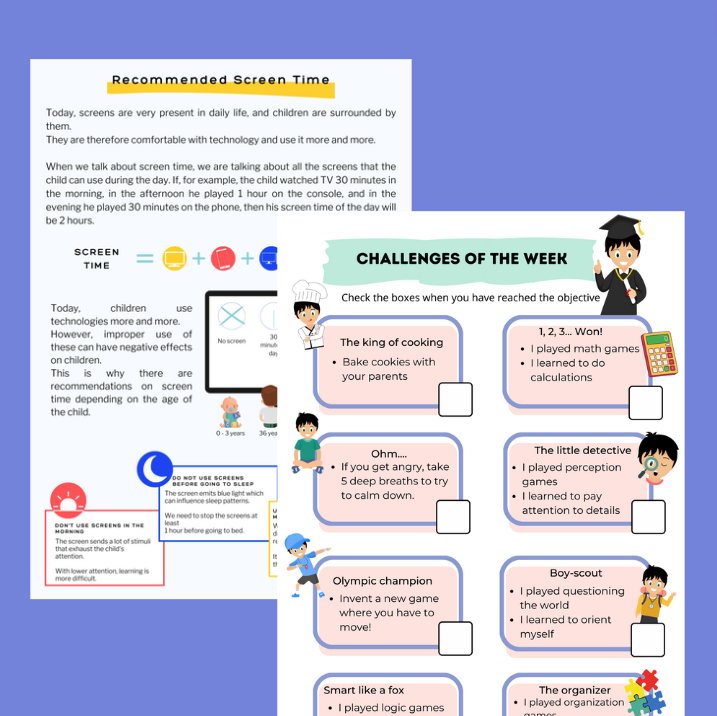
Share First Uses
When you introduce a new technology to your child, help him or her to discover it. Explain its use and monitor its initial interactions.
Share Family Moments
Set aside special screen-free moments for the family, such as mealtimes, car journeys and outdoor activities. These moments foster communication and family ties.
Take an interest in What They Do
Ask your children questions about what they’re doing on screen, and encourage them to share their activities with you. This strengthens communication and creates opportunities for interaction.
These tips from the practical booklet are designed to help families balance their use of screens and encourage responsible use. By following these guidelines, you can help your children enjoy the benefits of technology while minimizing the potential risks.
Our Screen Awareness Workshop offers a valuable opportunity for elementary school and teachers to promote responsible screen use among students. The free resources we make available guarantee easy implementation of this educational workshop. Together, we can help children develop healthy screen habits and a better understanding of their impact on their well-being.
Don’t miss this opportunity to help children navigate today’s digital world in a balanced and enlightened way. To access free resources and organize your workshop, please fill in the form below.
Download free workshop resources
By filling in the form you will have access to all the resources.
To carry out the COCO THINKS and COCO MOVES experimental session, simply download the application onto a tablet or computer. It’s free for 7 days.

Other articles that might interest you:
Supporting children with autism
Dynseo proposesSUPPORTING CHILDREN WITH AUTISM with COCO THINKS AND COCO MOVESDynseo and its team are very much...
Supporting DYS children with COCO THINKS and COCO MOVES
Dynseo proposesDYS disorders with COCO THINKS and COCO MOVESOur educational and pedagogical games program COCO THINKS...
Language development
Children communicate from birth with movements, crying, looking at each other or with smiles. After only a few months,...
Supporting children with Down Syndrome with Coco
Dynseo proposesDOWN SYNDROME with COCODown syndrome is a non-hereditary chromosomal abnormality that leads to the...
Supporting people after a stroke
Dynseo proposesStroke with CLINT, your brain training coachThe Dynseo team is very involved in helping people who have...
Supporting someone with Alzheimer’s
In this guide, we will detail how SCARLETT can be used for supporting someone with Alzheimer's. SCARLETT is a...
10 myths about the human brain you didn’t know
The brain is an incredible muscle, however there are many things we do not know, and what we do know is not always...
Using Digital Tools to Support Students with Special Educational Needs
Special Educational Needs (SEN) encompass a wide range of learning difficulties and disabilities that can hinder a...
Down Syndrome and Communication: Facilitating Interaction with Visual and Interactive Supports
When we think about Down syndrome, we often recognize it as a genetic condition that affects physical and cognitive...
How to Track Progress in People with Down Syndrome Using Digital Tools
Down syndrome, a genetic condition caused by the presence of an extra chromosome 21, affects approximately 1 in every...












